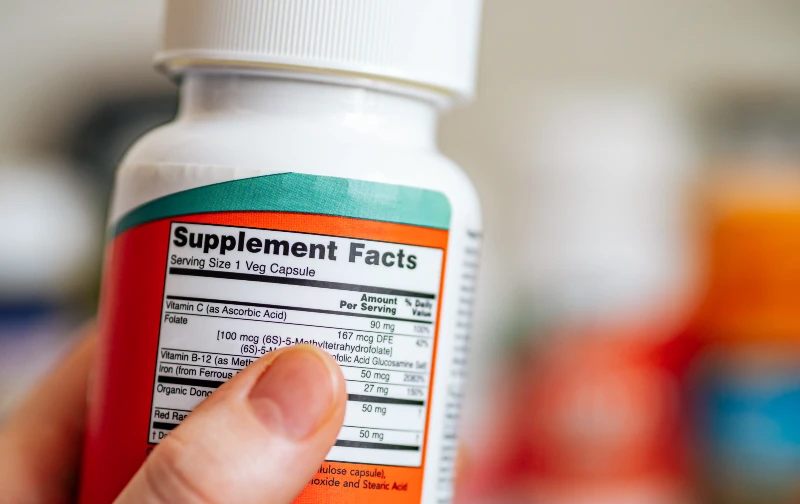Most people don’t get the recommended daily amounts of vitamins and minerals from their diet alone. Taking a multivitamin is one way to help fill in the gaps. Multivitamins can also provide nutrients that you might not get enough of if you have certain health conditions or follow a vegetarian or vegan diet.
For example, vegans may need to take a vitamin B12 supplement, since this nutrient is found mostly in animal products. People with gastrointestinal disorders like Crohn’s disease or celiac disease may also have trouble absorbing nutrients from food, making a daily multivitamin necessary.
When choosing a multivitamin, look for one that:
Contents
1. Vitamins in It
The Institute of Medicine (IOM) recommends the following daily intakes for vitamins and minerals. These amounts apply to healthy people who get adequate amounts of nutrients from their diet. People with certain health conditions or who take certain medications may need more or less of certain vitamins and minerals.
- A multivitamin supplement usually contain the following nutrients:
- Vitamin A (as beta-carotene or retinyl acetate) 700-900 micrograms (mcg)
- Vitamin C (ascorbic acid) 75-90 mg
- Vitamin D (as cholecalciferol) 15 mcg (600 IU)
- Vitamin E (as d-alpha tocopherol or dl-alpha tocopherol acetate) 15 mg
- Vitamin K (as phytonadione) 120 mcg
- Thiamin (vitamin B1, as thiamine mononitrate) 1.2-1.5 mg
- Riboflavin (vitamin B2) 1.3-1.7 mg
- Niacin (as niacinamide or nicotinic acid) 14-18 mg
- Vitamin B6 (as pyridoxine hydrochloride or pyridoxal 5′-phosphate) 1.3-1.7 mg
- Folate (as folic acid) 400 mcg
- Vitamin B12 (as cyanocobalamin or methylcobalamin) 2.4 mcg
- Biotin 30 mcg
- Pantothenic acid (vitamin B5, as calcium d-pantothenate) 5 mg
- Calcium (as carbonate, citrate, or other chelates) 1000 mg
- Magnesium (as oxide, citrate, or other chelates) 420-430 mg
- Zinc (as oxide, citrate, or other chelates) 11-13 mg
- Selenium (as L-selenomethionine or sodium selenite) 55 mcg
- Copper (as gluconate or other chelates) 0.9 mg
- Manganese (as sulfate or other chelates) 2.3 mg
- Chromium (picolinate or other chelates) 35 mcg
- Molybdenum (as sodium molybdate or other chelates) 45 mcg
- Potassium (as chloride, citrate, or other chelates) 3500 mg
2. USP verification
The United States Pharmacopeia (USP) is a scientific, nonprofit organization that establishes standards that are made available to the public for the identity, strength, quality, and purity of medications, food ingredients, and dietary supplements that are produced, distributed, and consumed globally. USP’s verification mark on a product means that it has been tested and meets USP’s quality standards.
3. Suitable for Your Age and Gender
Multivitamins are available in different formulations for different age groups and genders. For example, some multivitamins are specifically formulated for women who are pregnant or breastfeeding, while others are designed for seniors. Be sure to choose a multivitamin that is appropriate for your age and gender.
For example, pregnant women need higher levels of folic acid to help prevent birth defects, so they should look for a multivitamin that contains 400 micrograms (mcg) of folic acid. Older adults, on the other hand, may need a multivitamin that contains less iron, since older adults are more likely to be iron-deficient, and they need more calcium and vitamin D to help prevent osteoporosis.
4. Beware of Additives and Fillers
Some multivitamin supplements contain additives and fillers that can cause side effects or interact with medications. Watch out for the following ingredients:
- Artificial coloring agents
- Artificial sweeteners
- Preservatives
- Stearates (such as magnesium stearate)
- Titanium dioxide
- Talc
- Silica
- Shellac
- Gelatin
- FD&C Blue No. 2
- FD&C Red No. 40
- FD&C Yellow No. 6
5. Side Effects
Multivitamins are generally safe and well-tolerated. Some people may experience side effects, such as nausea, vomiting, diarrhea, bloating, and headaches. These side effects are usually mild and go away on their own.
More serious side effects are rare but may include allergic reactions, kidney stones, and an increased risk of certain cancers. People with certain health conditions or who take certain medications should speak to their doctor before taking a multivitamin supplement.
